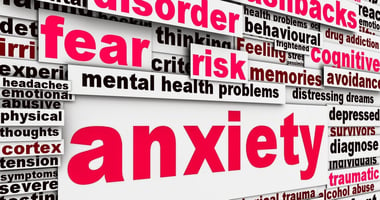Veterans with schizophrenia and a comorbid anxiety disorder have increased rates of other...
Hypochondriasis Linked to Increased Risk of Death

People who have hypochondriasis (health anxiety disorder) may have an increased risk of dying by either natural or unnatural causes, including death by suicide, compared with people who do not have the disorder, a study in JAMA Psychiatry has found. According to the International Statistical Classification of Diseases and Related Health Problems, Tenth Revision (ICD-10), people who have the disorder are preoccupied with thoughts that they have one or more serious and progressive physical disorders and repeatedly check for symptoms and seek reassurance from health professionals.
“[T]hese findings illustrate a paradox, whereby individuals with hypochondriasis have an increased risk of death despite their pervasive fears of illness and death,” wrote David Mataix-Cols, Ph.D., of the Karolinska Institutet in Stockholm and colleagues.
The researchers examined data from 4,129 people aged 6 years and older in the Swedish National Patient Register who received a diagnosis of hypochondriasis between January 1, 1997, and December 31, 2020, at the age of 6 years or older. The researchers matched those individuals with 41,290 demographically similar people without hypochondriasis. All individuals were followed until the date of death, emigration from Sweden, or the end of the study on December 31, 2020, whichever occurred first.
A total of 268 individuals with hypochondriasis and 1,761 individuals without hypochondriasis died of all causes during the follow-up. Those with hypochondriasis died at a mean age of 70 years, compared with a mean age of 75.1 years for those without the disorder.
Those with hypochondriasis had a 69% increased risk of dying of any cause, a 60% increased risk of dying of natural causes (for example, diseases of the circulatory, nervous, or respiratory systems), and a 143% increased risk of dying of unnatural causes compared with people without hypochondriasis. Those with hypochondriasis also had a 314% increased risk of dying by suicide, which was the most common cause of unnatural death. However, after the researchers adjusted for a history of depressive or anxiety disorders, suicide risk was no longer statistically significant.
“Clinicians should be aware that individuals with hypochondriasis are at risk of death by suicide, particularly if they have a lifetime history of depression and anxiety,” Mataix-Cols and colleagues wrote. “Dismissing these individuals’ somatic symptoms as imaginary may have dire consequences. More should be done to reduce stigma and improve detection, diagnosis, and appropriate integrated (i.e., psychiatric and somatic) care for these individuals.”
For related information, see The American Journal of Psychotherapy article “Psychodynamic Psychotherapy for Patients With Functional Somatic Disorders and the Road to Recovery.”
(Image: Getty Images/iStock/Laura Rosina)
Don't miss out! To learn about newly posted articles in Psychiatric News, please sign up here.






